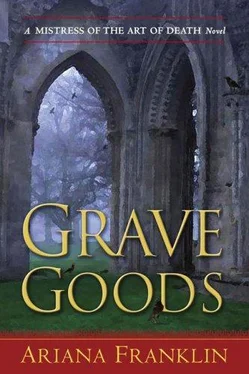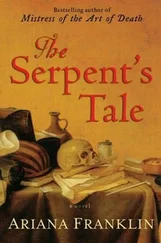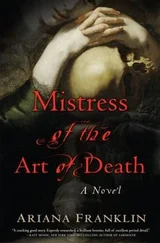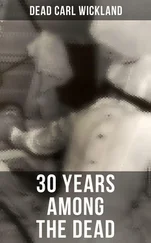The abbot said, “He… No, I must not think of myself in the third person… Me. I was that butcher. With the ax in my hand, I burst in on those two boys and hacked them to death where they lay in each other’s arms. I struck and struck and went on striking long after both were dead.”
The river was beginning to straggle through reeds now, and the punt nudged aside yellow water lilies as it went. Sandpipers called from the banks, a descant to the implacable human voice.
“I considered myself justified. Had I not followed the Lord’s action against Sodom and Gomorrah? Did not Leviticus say that a man who lies with a man as with a woman has committed a detestable act and should surely be put to death?”
Covered in blood, Lord Sigward went downstairs to sit at the table and stare at nothing.
Hilda had heard the shrieks and gone running to view the slaughterhouse. The dead boys were less important to her than her lord; nobody should know what the dear master had done.
She took over. Godwyn was sent to prepare a coffin while she swabbed and cleaned. The bodies were laid on a sheet; the bedding was burned.
“Not the least of my sins that night was that I involved my two good servants in it.” Abbot Sigward glanced up, but Godwyn kept his eyes on the river.
The corpses were put in their coffin, ready to be buried secretly somewhere on the estate…
And then the earthquake struck.
“The world tilted. The ground opened. Worst was the noise, as if God’s voice had come close and was blasting destruction through the clouds.” Abbot Sigward nodded to himself. “Which it was, which indeed it was. I heard Him. Is it for you to condemn, you murderer? Was it for this that I sent My Son to preach love and forgiveness? Who are you to set yourself up against Him? Two mothers’ sons you have killed, Sigward. In your arrogance and wickedness you have committed filicide twice over and the Son of Man has been crucified yet again.”
It was the voice that Saul heard on the Road to Damascus.
As it had to Saul, it showed Lord Sigward to himself. He cowered at what he saw, a creature of hatred, a vainglorious, pitiless upholder of all law except the one that mattered most, a murderer, not least of a gentle wife who had died loveless. He saw the Pit waiting for him, and it held no flames but was barren and empty, like his soul; he would be condemned to shiver in it alone through all eternity.
“I crawled, pleading for a mercy that would not be given me because I had shown none,” the abbot said. “The floor tossed beneath me in the cataclysm that was God’s condemnation.”
When at last the earth stopped quaking, it was another Sigward who rose to his feet, though he could barely stand upright for the horror of what he had done. He knew now that the boys he’d killed must not be buried in unsanctified ground; to placate a vengeful God, he would take their bodies to the nearest and holiest place he knew, Glastonbury Abbey.
“I was, of course, bargaining with my Lord, wicked creature that I was, leaving it to Him to say whether or not my crime should be discovered. If it were, I would take my punishment. If not, I promised Him that all my lands and possessions should go to Mother Church and I would spend the rest of my days in service of His loving Son.” Sigward turned to Adelia. “I told you, my lady, that I was a gambler. It was gambling.”
She nodded.
One thing he had not been able to do. “I could not let my son’s body go to its rest complete. In my fury, I had hacked it into three, throwing the sexual part onto the floor. Even now… Sweet Mary, what twisted madness… I would not bury it with him, as if I might still conceal what he was. Hilda saw to its disposal separately, another sin that she bore for me.”
Not Hilda, Adelia thought. It was Godwyn; tears were trickling down the man’s face. It was him-Lord, the wonderful strangeness of human nature. She wondered what he had done with that dreadful collop of flesh until it was skeletonized and he could give the bones a more decent interment because he’d loved and pitied the boy they’d belonged to.
That night the coffin containing the two lovers was put into a boat and rowed to the abbey’s landing stage. There was no one about-the monks were praying for deliverance up on the Tor.
Between them, Sigward, Hilda, and Godwyn hauled the coffin by ropes to the sanctity of the monks’ graveyard. “There was a fissure there, as if God with his earthquake had readied a burial place for our burden. We lowered the coffin into it and I prayed for mercy on those two souls, and mine. For the first time in my life, I wept…”
Adelia raised her head. “What was your son’s name?”
Rowley jerked round; he’d forgotten that she was there. The abbot had not; he smiled at her. “Arthur,” he said. “His name was Arthur.”
Of course it was. “And the other boy?” It seemed imperative to her to give him an identity.
“God forgive me,” Sigward said, “but if I ever knew it, I have forgotten it.” He stretched out a hand toward her. “Do you damn me?”
It wasn’t for her to do it. The man carried his own damnation with him. More important to Adelia was whether that one horrific sin, and its far-reaching consequences as Hilda attempted to conceal it, had damned three more people to death. How far to Lazarus? Each time they passed one of the marsh’s little islands, most of them uninhabited apart from cattle and sheep, she tensed with expectation-and was disappointed.
But the landscape was changing; its air was saltier, and reeds were beginning to give way here and there to marron grass where high tides had come inland, pushing in enough sand for it to grow on.
Adelia kept her eyes on a hump of ground still some way ahead that broke the dark blue, ruler-straight line of the horizon, hardly listening to the confession that went on and on, of which she had become weary.
Once he’d taken on a monk’s habit, the abbot said, he lived a life of penitence and rigid self-denial… “Even then, sinful as I was, I could not admit to anyone what I had done, though I confessed to God and begged His mercy every day.”
So exemplary had he been that his fellow monks had elected him as their abbot when the old one died.
He’d taken it as a sign that God was relenting to him and might relent further if he could advance Glastonbury’s holiness and prosperity.
“Which, by the Lord’s grace, I did,” Abbot Sigward said simply. “With every improvement, I became certain that I had gained forgiveness at last.” He shook his head. “But God’s memory is longer than that, and so, it seems, is a Welsh bard’s. When King Henry sent to tell us to dig between the pyramids, I thought, Is this Nemesis at last? Well, I shall accept her. But no, I was reprieved yet again; the bodies were taken to be those of King Arthur and Guinevere. The Lord has allowed me to work even harder for Him, I thought. Perhaps the fire that consumed my abbey was His final punishment, and now, in allowing my son and his friend to be misrepresented, they and I can bring the pilgrims back to Glastonbury.”
Startled, Adelia took her eyes off the island ahead to glance at the abbot. He’d laughed, actually laughed.
“Our Lord has humor,” he said to Rowley, “do you know that? He sent the true Nemesis in the guise of a Saracen and a woman-representatives of a race and a sex that the old Sigward despised.”
Adelia turned away, grateful that the voice had stopped at last. The only sound now came from the calling of a flock of geese flying inland.
“… Deinde, ego te absolve a peccatis tuis in nomine Patris, et Fili, et Spiritus Sancti.” Rowley was pronouncing the absolution in a voice she hardly recognized.
Sigward said, “And now this poor child here, I would wish her absolved from sins which sprang from mine. Come along now, Hilda, you will feel the better for it.” He might have been urging the woman at his knee to take some medicine and buck up.
Читать дальше












